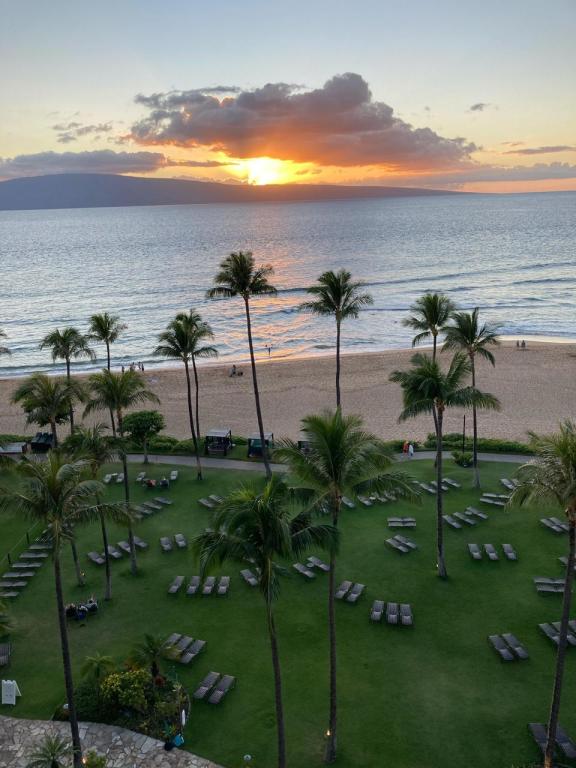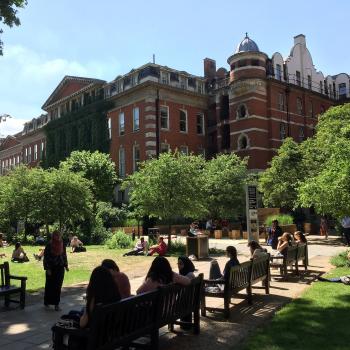
***
Earlier this evening, we watched the sun go down over the island of Lānaʻi, not quite nine miles away across the ‘Au‘au Channel to our west. Beautiful hues of orange, red, and blue. A few days ago, I saw the famous sunset “green flash” from a cliff at Corona Del Mar, in California. Not tonight, though. If nothing else, Lānaʻi got in the way. Earlier in the day, we watched a very active pod of whales out in the channel, spouting and occasionally breaching.
I know. I know. Life is tough. But travel is something that my wife and I both love to do — our hobby, actually — and we’ve been socking money away for a very long time in order to make trips like this possible for us in our latter years. (We didn’t spend on certain other things, because this was a priority.) We’ll see how long we can keep it up. These are really working vacations, though. I have several articles to write while I’m here, under deadlines, and a conference presentation proposal that is also under a strict deadline. (I finished my initial portion of a forthcoming joint-authored book last Monday.) I read Ist die Kirche Noch zu Retten? (by the late dissident Swiss Jesuit theologian Hans Küng) on the flight over the ocean. I have a very large new book by Francesca Stavrakopoulou to read. (I’ve committed to reviewing it.) And there is a lot of business related to the Interpreter Foundation and to our forthcoming docudrama to get through, to say nothing of the film project that intend to undertake thereafter. (We’ll announce it on Friday evening, 4 March, at the 2022 LDS Film Festival.) On the whole, though, I would just as soon attend to such things from a balcony overlooking the Pacific Ocean as to be working on them in my basement office.
***
Which reminds me of something: I mentioned here yesterday that we had just visited the tiny but fascinating cemetery that is currently known as Westwood Village Memorial Park. On one of the tombstones there — I don’t remember whose — was an inscription reading “All things considered, I’d rather be in Malibu.”
I thought that pretty funny, of course. But it occurred to me almost immediately that, if the accounts often given by near-death experiencers are true, that person instantly realized upon his actual death that, all things considered, he certainly wouldn’t rather be in Malibu. Those who report on their NDEs very often try, and fail, to describe the sheer beauty and wonderful peace of the place where they found themselves. They say, for instance, that there were colors that they had never seen on earth. And at least a few have commented how very dreary and drab this world seemed to them by comparison upon returning to consciousness here. Washed out. “Smoky,” I think one called it. And, very commonly, experiencers have related that they didn’t want to return from the “other world” but that either they were told by an authoritative person that it wasn’t yet their “time” or they realized that they had responsibilities (often to children) that they simply couldn’t abandon. Some have been angry at the medical personal who revived them.
I’ll mention one specific example from Latter-day Saint history: When Jedediah M. Grant, second counselor to Brigham Young in the First Presidency of the Church of Jesus Christ of Latter-day Saints, was dying in 1856 at the age of forty, he told Heber C. Kimball, the first counselor, “I have been into the spirit world two nights in succession, and, of all the dreads that ever came across me, the worst was to have to again return to my body, though I had to do it.” Speaking at President Grant’s funeral, President Kimball recalled Grant telling him about his returns to the body, and reported that “he felt extremely sorrowful at having to leave so beautiful a place and come back to earth, for he looked upon his body with loathing, but was obliged to enter it again.” (See Heber C. Kimball, in Journal of Discourses 4:135, 136 [4 December 1856].).
I’m guessing that not even the “green flash” or a sunset over the channel between Maui and Lānaʻi can compare with the world to come. “But as it is written, Eye hath not seen, nor ear heard, neither have entered into the heart of man, the things which God hath prepared for them that love him” (1 Corinthians 2:9). As he very often does, C. S. Lewis offers an interesting thought along these lines:
It would seem that Our Lord finds our desires not too strong, but too weak. We are half-hearted creatures, fooling about with drink and sex and ambition when infinite joy is offered us, like an ignorant child who wants to go on making mud pies in a slum because he cannot imagine what is meant by the offer of a holiday at the sea. We are far too easily pleased.
I suppose that I had that passage from Lewis in the back of my mind when, speaking at the graveside service in Miami for our firstborn grandchild back in 2014, I said this:
We lament what we’ve lost. But perhaps we’re focused too much on our own pain. Perhaps, if the words of prophets and apostles and of those who have glimpsed the next world are true, we’re like people living in a slum, sad that one of our friends has been taken away. We think of all the experiences that our friend won’t have with us—but our friend has been invited to live in the palace of the king. Our friend is living a life far better, in a place far more beautiful, than we can even begin to comprehend.
But I’ve caught myself committing that error many times. I’ve found myself wishing, for example, that I could tell my mother a joke that I’d just heard, or thinking how much my father would have been interested in an experience that I’d just had, or wanting to share something with my brother — I still have these moments, even after years of separation — and feeling sorry for them that they’re missing out on the amusing or fascinating thing that just happened. And then I realize that, from their vantage point, they would probably be far more justified in pitying me than I in pitying them.
Posted from Ka’anapali, Maui, Hawaiʻi











